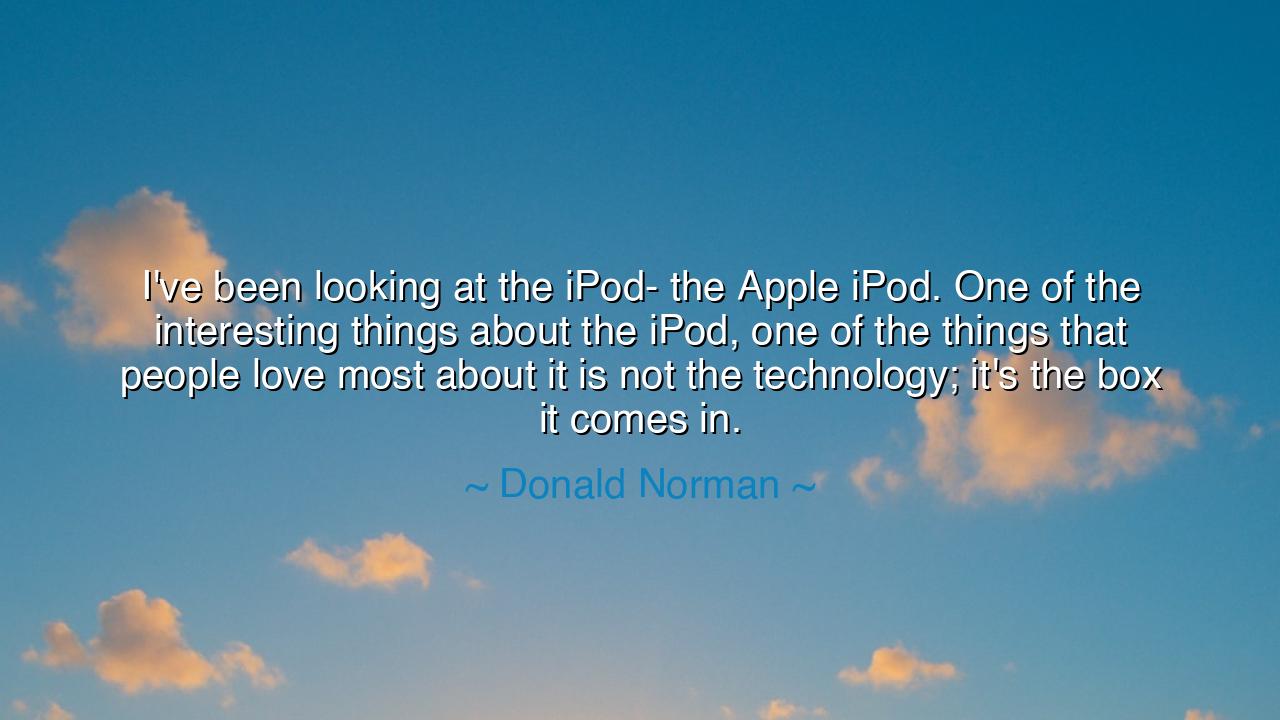
I've been looking at the iPod- the Apple iPod. One of the
I've been looking at the iPod- the Apple iPod. One of the interesting things about the iPod, one of the things that people love most about it is not the technology; it's the box it comes in.






Hear the words of Donald Norman, sage of design and human experience: “I’ve been looking at the iPod—the Apple iPod. One of the interesting things about the iPod, one of the things that people love most about it is not the technology; it’s the box it comes in.” These words, though simple, unveil a profound truth: that human beings do not live by function alone, but by meaning, beauty, and the rituals that surround the objects they love. For while the technology within the iPod was wondrous, it was the box, the wrapping, the first impression, that stirred delight and captured the imagination.
This teaching is ancient. For even in the earliest days, craftsmen did not only fashion tools—they adorned them. The sword was not only sharp; it was engraved with symbols of honor. The chalice was not only useful; it was gilded and decorated, a vessel of reverence. So it is with the iPod. Beneath its circuits lay brilliant engineering, yet people spoke of the box—its simplicity, its elegance, the way it honored the product within. It was not mere packaging; it was a ritual, an experience, a reminder that beauty and presentation are themselves forms of meaning.
Norman reminds us that the heart of man is drawn to the totality of experience. Technology alone is cold; it may impress, but it does not linger in the soul. What lingers is the way it was given, the care with which it was presented, the sense that the object was not tossed into our hands, but offered like a gift. Apple, in this sense, understood what emperors and poets long knew: that the box matters as much as what it carries, for it frames the way we perceive and cherish the treasure inside.
History offers a powerful example in the treasures of Egypt. The sarcophagi of the pharaohs were encased in layer upon layer of adorned coffins, each more intricate than the last. The body within was not seen, yet the box that contained it spoke of reverence, majesty, and power. The container magnified the value of what it held. Likewise, in Norman’s insight, the iPod’s box elevated the object, transforming it from a piece of machinery into an object of desire, almost sacred in its simplicity.
This wisdom speaks not only of design but of life itself. How often do we forget that the way we present something is as important as what we offer? A gift poorly wrapped diminishes the joy, no matter how great its value. A truth spoken without grace may wound more than it heals. A deed done without care may be forgotten, while a small gesture, presented with thoughtfulness, may endure forever. Presentation is not deception; it is the frame that allows the essence to shine.
Thus, the lesson is clear: value not only what you create, but how you present it to the world. Whether it is a work of art, an invention, a meal, or even your own words—remember that the box matters. Care in presentation is care for the soul of the receiver. It shows respect, dignity, and an understanding that beauty is itself a form of truth. The wise do not separate technology from ritual, nor utility from design, but bind them together so that the human heart may delight in both.
Practical wisdom lies before you: if you are a maker, honor your creation by honoring its form. If you are a giver, wrap your gift with thought, for the box is part of the gift itself. If you are a leader, remember that the way you deliver your words will shape whether they inspire or are ignored. And in your own life, adorn the ordinary with care—your meals, your greetings, your daily work—for in their presentation lies the quiet dignity of the human spirit.
So let Norman’s words echo like an ancient teaching: “It is not only the technology, but the box.” Remember always that beauty and care are not frivolous—they are sacred. They turn the functional into the meaningful, the ordinary into the extraordinary. For the soul does not love raw function alone; it longs for the harmony of usefulness and beauty, bound together in a single offering. And when we honor this truth, we rediscover what it means to touch both mind and heart with the work of our hands.






AAdministratorAdministrator
Welcome, honored guests. Please leave a comment, we will respond soon